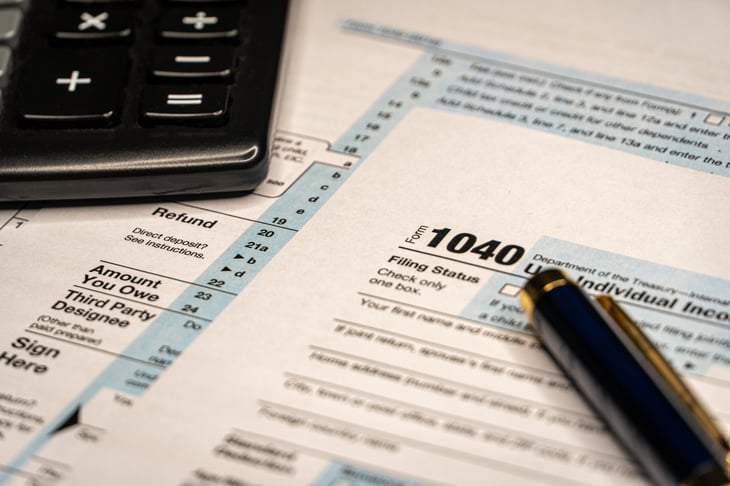
Welcome to Ask Money Talks News, a series answering financial questions submitted by Money Talks News readers and podcast listeners.
In this edition, we’re talking about two of everyone’s least favorite expenses: property taxes and income taxes.
The good news is that we’re going to tell you everything you need to know to determine whether you can potentially lower your state or federal income taxes — or perhaps both! — by deducting your property taxes.
We’ll also explain how you can submit a question to us if you have one of your own.
If you enjoy this series, sign up for the Money Talks Newsletter so you don’t miss the next edition.
The question at hand

AussieGR asks Money Talks News:
“Is my property tax deductible in Nevada when I retire? My home will be paid off.”
Thanks for your question, Aussie GR — and congratulations on paying off your home before retirement!
The answer to your question depends on whether you’re referring to deducting your property taxes on your state income tax return or your federal return. We’ll address both scenarios for you.
First, though, we want to note for you and everyone else reading that the deductibility of property taxes generally has nothing to do with whether the homeowner is working or retired, or whether the home is mortgaged or paid off. So the following information applies to anyone who pays property taxes, regardless of whether they’re retired or whether their home is paid off.
That said, there are property tax breaks for retirees specifically, so we’ll also touch on these options for reducing your property taxes in retirement.
Deducting property taxes on your state return

Residents of Nevada, like AussieGR, can’t deduct their property taxes on their state tax return because they don’t pay state income taxes in the first place. Nevada is one of several states without any kind of state income taxes.
Residents of the other states — as well as the District of Columbia and U.S. territories — may or may not be able to write off their property taxes on their state tax return. It depends on their state tax laws.
To learn more about income tax deductions in your state, your first stop should be the website of the agency that collects income taxes in your state. Do a web search for it, but note that the names of these agencies vary by state. For example, in Pennsylvania, it’s called the Department of Revenue, while in New York, it’s the Department of Taxation and Finance.
The instructions for filling out your state tax return also might help. Your state’s income-tax-collecting agency should be able to tell you where to find these instructions online.
Of course, you should also talk to the person who does your state tax return.
Even if you do your own return using commercial software, it should ask you questions to discern whether your property taxes are technically deductible and, if so, whether it’s financially advantageous for you to deduct them. (As we’ll discuss in the next section, there are situations in which taxpayers are qualified to deduct their property taxes but doing so would not actually lower their tax bill.)
Deducting property taxes on your federal return

Technically, you can deduct your property taxes on your federal return, but chances are it’s not financially advantageous to do so under current tax laws.
Property taxes are an itemized deduction, which means you can only claim them on your return if you opt to itemize your tax deductions as opposed to claiming the standard deduction, which is a flat amount. (Other common itemized deductions include mortgage interest, donations to charity, and in some cases, unreimbursed medical and dental expenses.)
The thing is, a federal law known as the Tax Cuts and Jobs Act of 2017 significantly increased the standard deduction, roughly doubling it. As a result, the vast majority of taxpayers are now better off claiming the standard deduction because it’s worth more than all their itemizable deductions combined.
For the 2024 tax year, for example, the standard deduction is worth anywhere from $14,600 (for a single person under age 65) to $32,300 (for two married people who are 65 or older and file a joint return).
Additionally, the same 2017 law lowered the amount of state and local tax (SALT) that a taxpayer can deduct, capping it at $10,000 per year. So even if a taxpayer’s real estate property taxes, personal property taxes, state and local income taxes, and state and local sales taxes amount to $15,000, for example, they can only deduct $10,000 of it.
To find out whether you are better off claiming the standard deduction or itemizing your deductions, consult your tax professional or tax software.
A tax pro can run both scenarios and then tell you exactly what your tax refund (or bill) would be if you claimed the standard deduction and if you itemized. If you do your own taxes, you can do the same on your own, although your software should automatically determine whether the standard deduction or itemizing leaves you better off.
Property tax breaks for retirees

In some states, homeowners who are over a certain age — as well as military veterans, people with disabilities and certain other groups — qualify for property tax breaks, such as exemptions.
Pennsylvania and Missouri are two examples of states that expanded or created property tax breaks for seniors in 2023.
So check with your state’s and county’s real estate divisions (often headed by an assessor or appraiser) to see if there are any exemptions you qualify for. (AussieGR, the contact information for all county assessors in Nevada can be found on the state’s Department of Taxation website.)
You can also try using AARP’s Property Tax-Aide, a free online resource, to learn about property tax breaks available to older homeowners in your area.
Some states allow older homeowners to defer property taxes, but this is not a tax break. In fact, it’s more like a loan because you are still expected to pay your taxes, just at a later date — and sometimes along with interest charges.
How to Ask Money Talks News

You can submit a question for the Ask Money Talks News series for free. Here’s how:
- Hit “reply” to the Money Talks Newsletter.
- Change the email subject line to Ask Money Talks News.
- Put your question in the email. Make sure to include enough detail for us to fully understand your question and any relevant context — but keep it all under 50 words.
- Hit “send.”
We can’t answer every question we receive, of course, but we do prioritize questions from Money Talks News members and questions that apply to a majority of our audience.





Add a Comment
Our Policy: We welcome relevant and respectful comments in order to foster healthy and informative discussions. All other comments may be removed. Comments with links are automatically held for moderation.